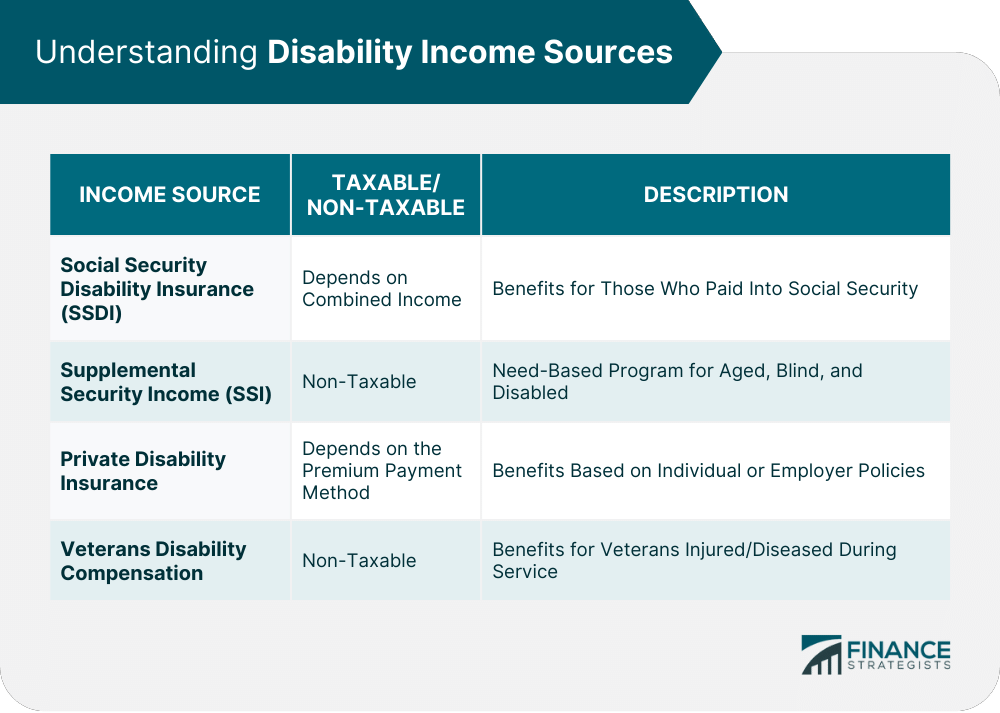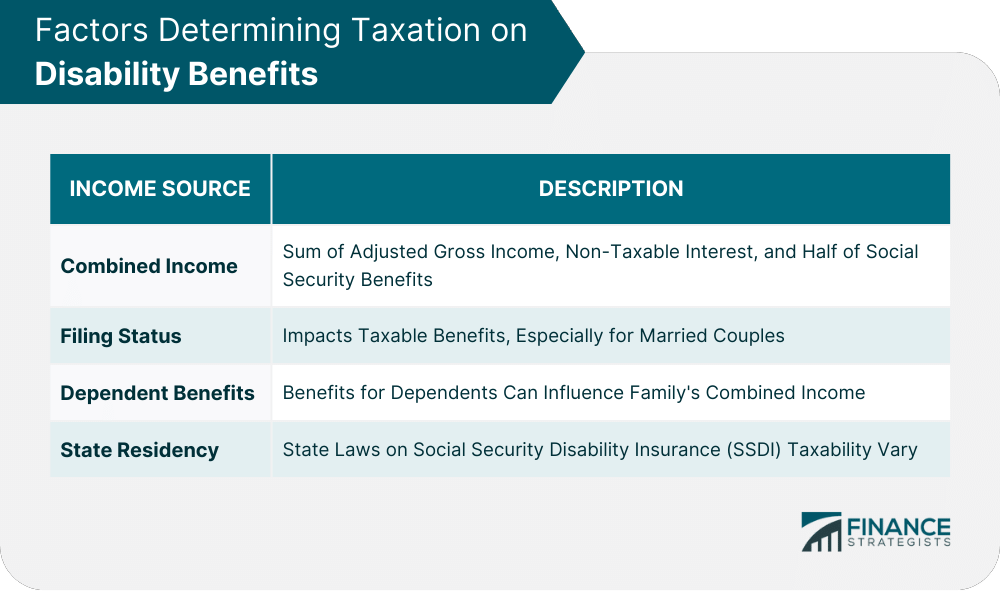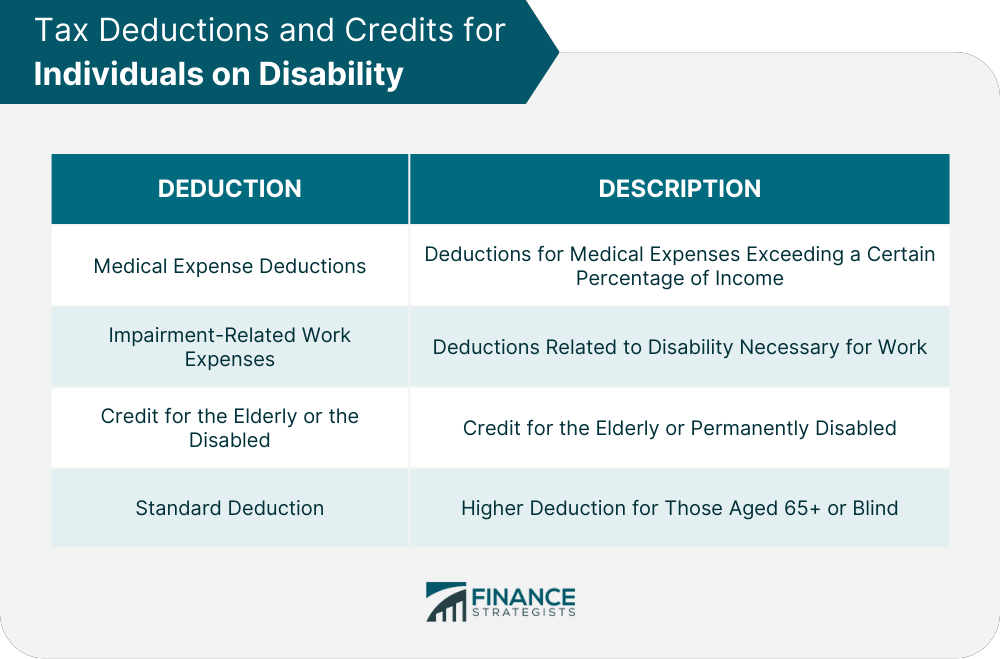When you're on disability, the requirement to file taxes depends on the nature and amount of your income. If you receive Social Security Disability Insurance (SSDI) benefits, they might be taxable if you have additional substantial income. Specifically, if half of your SSDI benefits plus your other income is more than $25,000 for individuals or $32,000 for couples (for both 2024 and 2025), some of your benefits may be taxable. On the other hand, Supplemental Security Income (SSI) is not taxable. However, if you receive disability payments from other sources, such as an employer-provided insurance plan or workers' compensation, these could be partially or fully taxable. It's essential to consult tax guidelines or a professional to understand your specific situation and determine if, and how much, of your disability income is subject to taxation. Disability benefits are essential for many individuals who, due to various circumstances, cannot work. But just as crucial is understanding the tax implications associated with these benefits. SSDI benefits are provided to individuals who have paid into the Social Security system and are no longer able to work. The taxation of SSDI largely depends on your total combined income, which includes half of your SSDI payments and all other income sources. If this combined income surpasses certain thresholds, portions of the SSDI may be taxable. SSI is a need-based program aimed at helping aged, blind, and disabled people who have little or no income. One crucial aspect of SSI benefits is that they are not taxable. The IRS does not consider these payments as taxable income, offering a reprieve for recipients. There's a significant difference between employer-provided disability policies and individual policies. If you've paid the premiums on an individual policy using after-tax dollars, any benefits you receive are generally not taxable. Conversely, if your employer pays for the policy or if you paid the premiums using pre-tax dollars, then the benefits might be fully or partially taxable. This compensation is a monthly tax-free payment to Veterans who got a disease or sustained an injury while serving in the Armed Forces. These payments are entirely exempt from federal taxation, ensuring that the heroes of our nation get the maximum benefit possible. A pivotal factor in determining tax implications is the concept of combined income. It's the sum of adjusted gross income, non-taxable interest, and half of the Social Security benefits. If the total surpasses the IRS-set threshold, which varies based on filing status, then part of the SSDI benefits becomes taxable. Your tax situation can significantly differ depending on your filing status. For instance, if you're married but filing separately and live with your spouse at any point during the year, your benefits might become taxable, regardless of your combined income. Another nuance to consider is when dependents, like children, receive benefits based on your record. These benefits can increase the family's combined income, which might make a portion of all the family's benefits taxable. While federal guidelines on SSDI taxation are uniform, state laws vary. Some states tax SSDI benefits, while others do not. It's vital to familiarize yourself with your specific state's rules to ensure compliance. Taxpayers on disability can deduct medical expenses that exceed a certain percentage of their adjusted gross income. This can include doctor visits, medications, and even some adaptive equipment or modifications to one's home. If a disabled person is employed, they can deduct expenses related to their disability that are necessary for work. This can range from special equipment to certain transportation costs. Those on disability may qualify for this tax credit, which is specifically designed to provide financial relief to the elderly or the permanently and totally disabled. The exact amount of credit varies based on filing status and income. Taxpayers who are blind or aged 65 and older might be eligible for a higher standard deduction. This can significantly reduce taxable income, offering tangible relief. The SSA will provide an SSA-1099 form that outlines the total disability benefits received during the year. This form is essential when preparing tax returns, providing clarity on what amounts might be taxable. Choosing the right tax form is crucial. Most people on disability will use the standard 1040 form, but there are variations (like the 1040A) based on specific situations and the deductions or credits claimed. It's never a bad idea to seek assistance, especially given the intricacies of disability-related tax rules. Some agencies offer free tax preparation services. However, for complex situations, consulting a tax professional might be the best route. Ignoring tax obligations can lead to penalties and interest accruing on unpaid taxes. These amounts can add up, creating a substantial financial burden over time. By not filing, individuals might miss out on potential refunds. Overpayment of taxes, especially when tax credits or deductions are overlooked, can result in lost money if one doesn't file a timely return. The IRS takes tax evasion seriously. Consistent failure to file or underreporting of taxable disability benefits can lead to audits, tax liens, or even legal action. Navigating tax obligations while on disability is essential to ensure compliance and optimize financial well-being. Disability income sources, such as SSDI and SSI, have distinct tax implications, with SSDI potentially being taxable depending on one's combined income and SSI being non-taxable. Private disability insurance payments may vary in taxability based on how premiums were paid. Notably, Veteran's Disability Compensation remains tax-free. Key determinants of tax implications include combined income, filing status, dependent benefits, and state residency. Beneficiaries should be proactive, leveraging available tax deductions and credits, such as medical expense deductions and credits for the elderly or disabled. Moreover, the SSA-1099 form provides clarity on received benefits, aiding in accurate tax filing. Given the complexity of disability-related tax rules, seeking professional assistance is advisable. Failing to comply can result in penalties, lost refunds, or legal repercussions, emphasizing the importance of understanding and fulfilling one's tax responsibilities.Do You Have to File Taxes When on Disability?
Understanding Disability Income Sources
Social Security Disability Insurance (SSDI)
Supplemental Security Income (SSI)
Private Disability Insurance
Veterans Disability Compensation

Factors Determining Taxation on Disability Benefits
Combined Income
Filing Status
Dependent Benefits
State Residency

Tax Deductions and Credits for Individuals on Disability
Medical Expense Deductions
Impairment-Related Work Expenses
Credit for the Elderly or the Disabled
Standard Deduction

Tax Filing Process for Individuals on Disability
Required Documentation
Selecting the Correct Tax Form
Seeking Assistance
Potential Consequences of Not Filing Taxes When Required
Penalties and Interest
Loss of Potential Refunds
Legal Repercussions
Conclusion
Do You Have to File Taxes When on Disability? FAQs
Yes, if your combined income exceeds certain thresholds set by the IRS. Combined income includes half of your SSDI payments and all other income sources.
No, Supplemental Security Income (SSI) benefits are not considered taxable income by the IRS. Generally, recipients do not have to file taxes solely based on SSI benefits.
It depends on who paid the premiums. If you paid with after-tax dollars, the benefits are generally not taxable. However, if your employer paid the premiums or if you use pre-tax dollars, the benefits might be taxable.
No, Veterans Disability Compensation is tax-free at the federal level. Veterans do not have to include this compensation as taxable income.
Yes, there are specific deductions like Medical Expense Deductions and Impairment-Related Work Expenses. Additionally, credits such as the Credit for the Elderly or the Disabled may be available to qualifying individuals.
True Tamplin is a published author, public speaker, CEO of UpDigital, and founder of Finance Strategists.
True is a Certified Educator in Personal Finance (CEPF®), author of The Handy Financial Ratios Guide, a member of the Society for Advancing Business Editing and Writing, contributes to his financial education site, Finance Strategists, and has spoken to various financial communities such as the CFA Institute, as well as university students like his Alma mater, Biola University, where he received a bachelor of science in business and data analytics.
To learn more about True, visit his personal website or view his author profiles on Amazon, Nasdaq and Forbes.











